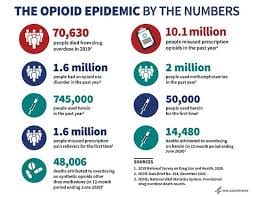Navigating the Opioid Crisis: Implications for Virginia's Personal Injury Victims and Legal Landscape
Introduction
Brief History and Current State of the Opioid Epidemic in Virginia
The opioid crisis in Virginia, like in the rest of the United States, started in the late 1990s. Drug companies told doctors that prescription opioids were not addictive, leading to many people getting these drugs. This false information caused a lot of people to misuse and get addicted to opioids.
As people realized how addictive opioids were, many who started with prescription drugs turned to illegal drugs like heroin and fentanyl. These drugs are cheaper and stronger, making the crisis worse. This shift has led to more overdose deaths and a big public health problem.
Statistics on Opioid-Related Deaths and Overdoses in the State
The opioid crisis in Virginia is very serious. In 2021, over 1,500 people died from opioid-related causes. This number has been going up over the years, showing how bad the problem is.
The financial cost of the opioid crisis is also huge. In 2021, it cost Virginians about $5 billion. This includes healthcare costs, lost work, and other expenses. These numbers show how much the opioid crisis affects the state.
For more details, you can read The opioid epidemic cost Virginians $5 billion in 2021.
The Impact of the Opioid Crisis on Personal Injury Victims
For people who have been hurt, getting better can be hard. If they also have an opioid addiction, it becomes even harder. Opioids, which are often given for pain, can quickly lead to addiction. This makes the healing process more difficult. The pain from injuries gets worse with withdrawal symptoms and the constant need for the drug.Opioid addiction can also cause other health problems like breathing issues, stomach problems, and infections. These problems make recovery take longer and lower the quality of life. Emotionally, people may feel shame, guilt, and hopelessness, making it even harder to get better.
Stories of People Affected by Both Personal Injuries and Opioid Addiction
Take John, a construction worker from Roanoke, Virginia. After a bad fall at work, he was given opioids for his pain. What started as a medical treatment turned into an addiction. John's addiction delayed his recovery and hurt his relationships and finances. His story shows how opioid addiction can ruin lives.
Another example is Maria, a mother from Virginia Beach who was in a car accident. She was given opioids for her injuries and became addicted. Her addiction led to many hospital visits and a long recovery, making it hard for her to care for her kids and go back to work. Maria's story shows how opioid addiction affects not just the person but their family too.
These stories are not rare. Many people in Virginia face similar issues. For more on how communities are responding, read Residents in southwest Virginia demand accountability.
Complications in Legal Battles
Challenges Faced by Personal Injury Victims in Proving Their Cases When Opioid Use Is Involved
For personal injury victims, getting justice and compensation can be tough. When opioids are involved, it gets even harder. One big challenge is proving their pain and suffering are real while dealing with an addiction. Insurance companies and lawyers may say the pain is only because of the addiction, not the injury.
Also, medical records showing opioid prescriptions can be used against them. This makes it hard to prove the injury caused the need for compensation. Victims need a lot of documents and expert opinions to support their claims.
The Stigma Associated with Opioid Addiction and Its Impact on Legal Proceedings
The stigma around opioid addiction makes legal battles even tougher. Many people see addiction as a moral failure, not a medical issue. This bias can affect judges, juries, and even lawyers.
This stigma can lead to unfair assumptions that the victim is not trustworthy, hurting their case. It can also make witnesses less willing to testify for them. The result is a legal system that is often unsympathetic to personal injury victims with opioid addiction.
There are many cases where opioid use made it harder to get justice. Victims often have to fight for their physical recovery and their right to be heard in court. These cases show the need for a more understanding approach to legal proceedings involving opioid addiction.
The Role of Legal Representatives
Importance of Having Knowledgeable and Experienced Attorneys in Opioid-Related Personal Injury Cases
In opioid-related personal injury cases, having a knowledgeable and experienced attorney is crucial. These cases are complex and need a deep understanding of both medical and legal issues. Attorneys who specialize in this area know the details of opioid addiction and how it affects personal injury claims. They can counter arguments that try to undermine the victim's pain and suffering.
Experienced attorneys know the tactics used by insurance companies and opposing lawyers to discredit victims. They can prepare strong defenses to protect their clients' rights. Their expertise ensures that all important medical records, expert testimonies, and evidence are gathered and presented well, strengthening the victim's case.
How Attorneys Can Help Navigate the Complexities of These Cases
Attorneys help navigate the complexities of opioid-related personal injury cases. They provide legal guidance, helping victims understand their rights and the legal process. From filing claims to negotiating settlements, attorneys are there every step of the way.
One key way attorneys help is by getting expert testimonies from medical professionals. These experts can validate the victim's pain and the need for opioids. This is important in countering claims that the victim's suffering is only due to addiction. Attorneys also work to remove the stigma associated with opioid use, showing their clients as people deserving of empathy and justice.
Attorneys also fight for fair compensation that covers the victim's physical, emotional, and financial suffering. They negotiate with insurance companies and, if needed, represent their clients in court. By providing personalized attention and support, attorneys help victims navigate their legal battles with confidence.
For more on the importance of legal representation in opioid-related cases, read Virginia's Opioid Crisis.
Ensuring Fair Compensation
Strategies for Securing Fair Compensation for Victims Affected by Both Personal Injuries and Opioid Addiction
Getting fair compensation for victims with both personal injuries and opioid addiction needs a detailed approach. One effective strategy is to document the victim's injuries and how opioid addiction affects their life. This includes medical records, expert testimonies, and personal stories that show the severity of their condition.
Attorneys work with medical professionals to create reports linking the victim's injuries to their opioid use. These reports can counter arguments that try to reduce the victim's claims.
Another important strategy is to calculate all the victim's losses, including medical expenses, lost wages, and pain and suffering. By presenting a thorough claim, attorneys can negotiate better with insurance companies and opposing lawyers to get a fair settlement.
The Role of Legal Representatives in Advocating for Their Clients' Rights and Interests
Legal representatives play a key role in advocating for their clients' rights and interests. They make sure the victim's story is heard and their suffering is recognized. Attorneys know how to navigate the legal system and challenge any biases that may come up.
One of the main roles of an attorney is to negotiate with insurance companies. Insurance adjusters often try to minimize payouts, but a skilled attorney can counter this by presenting strong evidence and legal arguments. They fight to make sure the compensation offered is fair and enough to cover all the victim's needs.
If a settlement can't be reached, attorneys are ready to go to court. They represent their clients with dedication, presenting a strong case to the judge and jury. Their goal is to get a verdict that provides the victim with the financial resources needed to rebuild their life.
By providing personalized attention and support, legal representatives help victims navigate their cases and achieve justice. For more on the role of legal representatives in opioid-related cases, read Virginia's Opioid Crisis.
Strategies for Supporting Recovery
Importance of Comprehensive Medical Care for Personal Injury Victims Dealing with Opioid Addiction
For personal injury victims with opioid addiction, comprehensive medical care is essential. This care must address both the physical injuries and the addiction. Integrated treatment plans that combine pain management, addiction therapy, and mental health support are crucial.
Effective pain management strategies are important to prevent further dependency on opioids. This may include alternative pain relief methods like physical therapy, acupuncture, and non-opioid medications. Addiction therapy, including counseling and behavioral therapy, helps individuals understand and overcome their dependency on opioids.
Mental health support is another critical part, as many personal injury victims with opioid addiction suffer from anxiety, depression, and other issues. Comprehensive care that includes mental health services can greatly improve recovery outcomes.
Resources Available in Virginia for Addiction Treatment and Recovery
Virginia offers many resources to support individuals dealing with opioid addiction. These include state-funded programs, community organizations, and healthcare facilities dedicated to addiction treatment and recovery.
The Virginia Department of Health provides services like the Virginia Opioid Addiction Treatment Program, which offers medication-assisted treatment (MAT) and counseling. MAT combines medications like methadone, buprenorphine, or naltrexone with counseling and behavioral therapies to treat opioid use disorder.
Community organizations like the Virginia Harm Reduction Coalition work to reduce the negative effects of drug use through education, outreach, and support services. These groups often provide naloxone distribution programs, which give people life-saving medication to reverse opioid overdoses.
Healthcare facilities across the state, including specialized addiction treatment centers, offer inpatient and outpatient programs tailored to the needs of individuals with opioid addiction. These programs provide a structured environment for detoxification, therapy, and long-term recovery planning.
For more information on available resources, read Drug Overdose and Related Health Outcomes.
Community and Legal Support Systems
Role of Community Organizations and Support Groups in Aiding Recovery
Community organizations and support groups play a big role in helping personal injury victims with opioid addiction. These groups provide a sense of belonging and emotional support, which are crucial for recovery.
Organizations like the Virginia Harm Reduction Coalition and local chapters of groups like Narcotics Anonymous offer peer support, educational resources, and harm reduction services. These groups create safe spaces where individuals can share their experiences, get encouragement, and learn from others who have faced similar struggles.
Support groups also help people access resources like housing assistance, job training, and healthcare services, which are essential for a full recovery. By fostering a supportive community, these organizations help individuals build resilience and stay committed to recovery.
Legal Resources and Support Systems Available for Personal Injury Victims in Virginia
In addition to community support, legal resources are vital for personal injury victims dealing with opioid addiction. Virginia offers many legal support systems to help these individuals get justice and fair compensation.
Legal aid organizations, like the Virginia Legal Aid Society, provide free or low-cost legal services to people who can't afford private representation. These organizations help victims understand their rights, navigate the legal system, and advocate for their interests in court.
Specialized legal services, like those offered by personal injury law firms, focus on cases involving opioid addiction. These firms have the expertise to handle the unique challenges of such cases, from gathering evidence to negotiating with insurance companies. They work hard to ensure that victims get the compensation they deserve.
State and local bar associations often offer referral services to connect people with experienced attorneys who specialize in personal injury and addiction-related cases. These resources ensure that victims have access to the legal support they need.
For more information on legal resources and support systems, read Virginia Department of Health and VCU partner to launch an opioid cost calculator.


